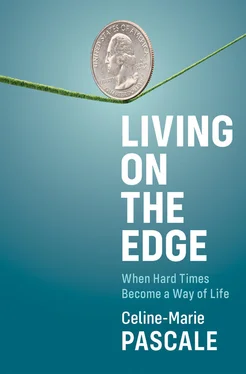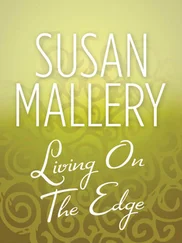Peter Edelman, Carmack Waterhouse Professor of Law and Public Policy and Faculty Director of the Center on Poverty and Inequality, Georgetown Law Center
“This thorough and penetrating book offers a convincing argument about why so many families are struggling to make ends meet and who they are as fully rounded people. The writing and narration are superb. I would call this a page turner, which is not my usual experience in reading books on this topic.”
Susan Greenbaum, Emerita Professor of Anthropology, University of South Florida
Living on the Edge
When Hard Times Become a Way of Life
Celine-Marie Pascale
polity
Copyright © Celine-Marie Pascale 2021
The right of Celine-Marie Pascale to be identified as Author of this Work has been asserted in accordance with the UK Copyright, Designs and Patents Act 1988.
First published in 2021 by Polity Press
Polity Press
65 Bridge Street
Cambridge CB2 1UR, UK
Polity Press
101 Station Landing
Suite 300
Medford, MA 02155, USA
All rights reserved. Except for the quotation of short passages for the purpose of criticism and review, no part of this publication may be reproduced, stored in a retrieval system or transmitted, in any form or by any means, electronic, mechanical, photocopying, recording or otherwise, without the prior permission of the publisher.
ISBN-13: 978-1-5095-4823-1
ISBN-13: 978-1-5095-4824-8(pb)
A catalogue record for this book is available from the British Library.
Library of Congress Cataloging-in-Publication Data
Names: Pascale, Celine-Marie, 1956- author.
Title: Living on the edge : when hard times become a way of life / Celine-Marie Pascale.
Description: Cambridge, UK ; Medford, MA : Polity Press, 2021. | Includes bibliographical references. | Summary: “A portrait of struggling America and how it has been left behind”-- Provided by publisher.
Identifiers: LCCN 2021011270 (print) | LCCN 2021011271 (ebook) | ISBN 9781509548231 (hardback) | ISBN 9781509548248 (paperback) | ISBN 9781509548255 (epub)
Subjects: LCSH: Working poor--United States. | Poverty--United States. | Equality--United States. | United States--Economic conditions--2009- | United States--Social conditions--1980-
Classification: LCC HD8072.5 .P38 2021 (print) | LCC HD8072.5 (ebook) | DDC 305.5/620973--dc23
LC record available at https://lccn.loc.gov/2021011270
LC ebook record available at https://lccn.loc.gov/2021011271
Typeset in 10.5 on 12 pt Sabon
by Fakenham Prepress Solutions, Fakenham, Norfolk NR21 8NL
Printed and bound in Great Britain by TJ Books Ltd, Padstow, Cornwall
The publisher has used its best endeavours to ensure that the URLs for external websites referred to in this book are correct and active at the time of going to press. However, the publisher has no responsibility for the websites and can make no guarantee that a site will remain live or that the content is or will remain appropriate.
Every effort has been made to trace all copyright holders, but if any have been overlooked the publisher will be pleased to include any necessary credits in any subsequent reprint or edition.
For further information on Polity, visit our website: politybooks.com
… the opposite of poverty is not wealth; the opposite of poverty is justice.
– Bryan Stevenson, Just Mercy
Researching and writing Living on the Edge was both harder and more rewarding than I ever could have imagined. As many readers will recognize, in challenging times the smallest amount of support has enormous impact, and so it has been for me in the years of writing this book. My efforts have been sustained by the inspiring work of others, small acts of kindness from complete strangers, and the sustenance of colleagues, friends, and family.
My first thanks must go to all of the people in struggling communities who talked with me both casually and in formal interviews. In the interviews people willingly risked a great deal. They trusted me with the details of their lives – often personal details for which they have been shamed. They took such risks because they believed in the importance of the project and they trusted my ability to see the dignity in their struggles, to use their own words in ways they had intended, and to protect their privacy. I am indebted to each of them and I hope this book repays their trust a hundred times over.
The College of Arts & Sciences at American University provided both a research fund and a Mellon Grant to support my research; this was a significant help in getting the project off of the ground. I owe special thanks to my colleague Angie Luvara for inspired and inspiring conversations about Appalachia and the people who live there. Steven Jones helped me to kick-off the project by piloting an interview with me. Riham Amin offered insights as an initial reader on several chapters, as did Chris Guilfry and Allan S. Pollock. Flora Ingenhousz provided invaluable support for the early stages of the project. Throughout the initial framing of the book, Josephine Ross was an invaluable sounding board and a generous reader. I also want to acknowledge the generosity of my colleagues Cynthia Miller-Idriss, Ernesto Castañeda, and Rachel Louise Snyder for their helpful advice. Carlos Barillo, Marie Garcia, and Mike Mullen – thank you for all of the ways large and small that you have supported me and my family through this project and through far more.
Over the years Bandana Purkayastha has threaded through my life as a cherished colleague. Bandana and I first crossed paths at a professional sociology meeting more than twenty years ago. At her invitation I presented a preliminary paper based on research for this book at the Eastern Sociological Society Presidential Panel in 2019. It was there that Bandana introduced me to Jonathan Skerrett, an editor at Polity, with whom she was working. From the start, Jonathan’s confidence in this book was matched by his editorial acumen. It was an opportunity of a lifetime to work with Jonathan, his thoughtful suggestions and guidance have shaped every chapter. I owe great thanks to the entire Polity team, from the cover designer Rob Lock, to Rachel Moore for keeping the trains on time, to Tim Clark for spectacular editing, and to John Thompson for his work behind the scenes. Each member of the Polity team brought their areas of expertise to bear on the manuscript to make Living on the Edge: When Hard Times Become A Way of Life the best possible version of itself. I owe gratitude as well to the five external reviewers who offered anonymous feedback on the manuscript. Their feedback was equally thoughtful and clarifying.
During the years that I spent researching and writing Living on the Edge , my spouse, Mercedes Santos, carried the heaviest burdens of my travel and writing time. Still, she was the one who kept the wheels on the bus and an espresso at easy reach. Her willingness to read everything, regardless of how much sense it made, or how many times she had seen it, was an incredible act of generosity. I am grateful for our many years together and our unending journey of “beginner’s mind.” There are not enough words. Thank goodness.
In Oakland, California, twenty-something Angel Perez tells me: “I see people that work two, three jobs just to be able to pay their rent, and sometimes they might not be able to make ends meet to provide food for the family. That’s a thing that frustrates me. There’s other people that have so much money and so much wealth.”
The strain Angel describes is common reality for low-wage workers, many of whom work more than full-time and still can’t make ends meet. Most people expect to work hard; they expect they will have to stretch financially from time to time. Yet working full-time is often not enough to pay basic bills, to provide regular access to adequate food, to obtain decent housing, or to cover all of the expenses that come with having children. And this was the case even before the Covid-19 pandemic hit, during a period of low unemployment and strong economic growth. How is this possible? Part of the answer is that four decades of increased productivity have had almost zero impact on the average pay of millions of Americans. 1The other part of the answer is the proliferation of low-wage work.
Читать дальше












